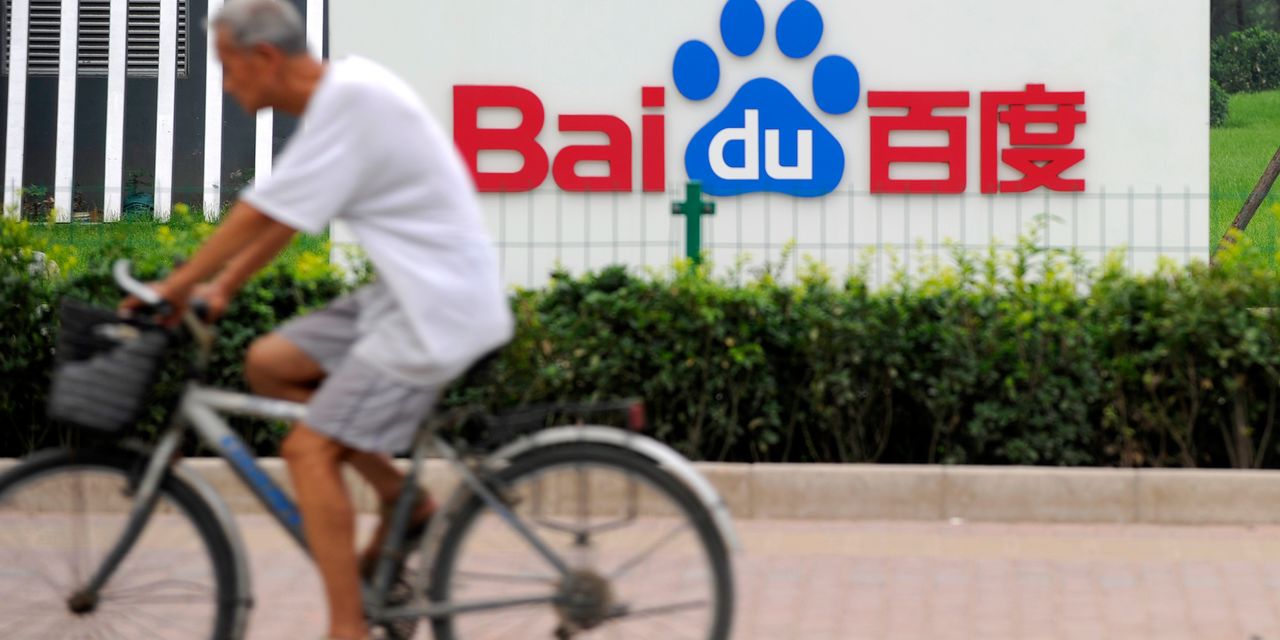Baidu
on Tuesday did something that peers in Chinese tech failed to do. It delivered earnings ahead of expectations, convincingly driving the stock higher and cutting through the concerns over China’s economic slowdown that have rattled markets.
Baidu (ticker: BIDU) reported a per-share profit of 22.55 Chinese yuan ($3.09) on revenue of 34.1 billion yuan ($4.7 billion) in the June quarter, firmly outpacing expectations of earnings at 16.80 yuan per share on revenue of 33.3 billion yuan.
U.S.-listed shares of Baidu were up 2.5%.
Baidu didn’t issue financial forecasts in its earnings release, which is typical for the group. But unlike some Chinese tech peers that saw their stocks falter after issuing strong earnings without guidance amid worries over China’s economic slowdown, Baidu shares are heading decisively higher.
JD.com
(JD) stock, for example, plunged despite an earnings beat. Shares in
Alibaba
(BABA) initially popped higher on solid results before the stock saw four straight days of declines.
Likely aiding the outperformance is Baidu’s exposure to artificial intelligence and the fact that Baidu’s earnings beat forecasts by a wider margin. Per-share profit was 34% ahead of consensus, an upside surprise much larger than those from Alibaba or JD.com.
“Baidu Core accelerated revenue and profit growth, driven by the solid performance of online marketing business and operating leverage,” CEO Robin Li said in a statement. “Generative AI and large language models hold immense transformative power in numerous industries, presenting a significant market opportunity for us.”
Indeed, hype over AI may be one reason for investors to be thankful. Baidu is a sprawling tech company with a core focus on online search and advertising—which has earned it the moniker of China’s Google—though it also has units devoted to driverless taxis, cloud computing, and AI.
A pivot to AI this year, including launching “Ernie Bot,” a rival to ChatGPT, has come as Baidu stock has outperformed this year. It is up 9% in 2023, while the Hang Seng Tech Index—Baidu is also listed in Hong Kong—is down 3% over the same period. Popular China tech stocks like Alibaba and JD.com are firmly in the red.
While China tech peers have also turned toward AI, Baidu arguably has a more compelling platform from which to expand into the space, such as a self-driving taxi arm called Apollo Go. The autonomous ride-hailing service itself showed solid growth, with 714,000 rides in the second quarter, up 149% since last year. As U.S. investors will know, exposure to AI has been a key force driving stocks higher this year, with the likes of chipmaker
Nvidia
(NVDA) exploding in value and buoying the
S&P 500
index.
Revenue from sources other than online marketing, which includes sales in the cloud and AI businesses, was 6.8 billion yuan, up 12% annually.
The core business of search and advertising wasn’t too shabby, either. Revenue from online marketing rose 15% from last year to 19.6 billion yuan. That’s a sign of some resilience among advertisers despite the economic slowdown that China faces—a macro trend that often hits the ad business first.
The company’s lack of outlook, while not unusual, is a reminder of the uncertainty ahead for Chinese tech stocks. For the time being, however, Baidu’s results and exposure to AI should bolster confidence among investors.
Write to Jack Denton at [email protected]
Read the full article here




